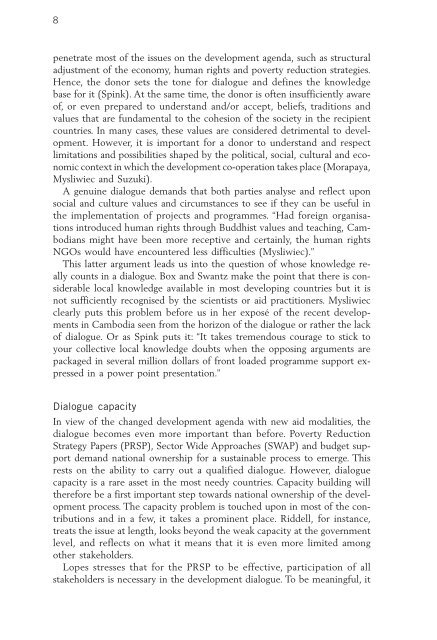Dialogue in Pursuit of Development - Are you looking for one of ...
Dialogue in Pursuit of Development - Are you looking for one of ...
Dialogue in Pursuit of Development - Are you looking for one of ...
You also want an ePaper? Increase the reach of your titles
YUMPU automatically turns print PDFs into web optimized ePapers that Google loves.
8<br />
penetrate most <strong>of</strong> the issues on the development agenda, such as structural<br />
adjustment <strong>of</strong> the economy, human rights and poverty reduction strategies.<br />
Hence, the donor sets the t<strong>one</strong> <strong>for</strong> dialogue and def<strong>in</strong>es the knowledge<br />
base <strong>for</strong> it (Sp<strong>in</strong>k). At the same time, the donor is <strong>of</strong>ten <strong>in</strong>sufficiently aware<br />
<strong>of</strong>, or even prepared to understand and/or accept, beliefs, traditions and<br />
values that are fundamental to the cohesion <strong>of</strong> the society <strong>in</strong> the recipient<br />
countries. In many cases, these values are considered detrimental to development.<br />
However, it is important <strong>for</strong> a donor to understand and respect<br />
limitations and possibilities shaped by the political, social, cultural and economic<br />
context <strong>in</strong> which the development co-operation takes place (Morapaya,<br />
Mysliwiec and Suzuki).<br />
A genu<strong>in</strong>e dialogue demands that both parties analyse and reflect upon<br />
social and culture values and circumstances to see if they can be useful <strong>in</strong><br />
the implementation <strong>of</strong> projects and programmes. “Had <strong>for</strong>eign organisations<br />
<strong>in</strong>troduced human rights through Buddhist values and teach<strong>in</strong>g, Cambodians<br />
might have been more receptive and certa<strong>in</strong>ly, the human rights<br />
NGOs would have encountered less difficulties (Mysliwiec).”<br />
This latter argument leads us <strong>in</strong>to the question <strong>of</strong> whose knowledge really<br />
counts <strong>in</strong> a dialogue. Box and Swantz make the po<strong>in</strong>t that there is considerable<br />
local knowledge available <strong>in</strong> most develop<strong>in</strong>g countries but it is<br />
not sufficiently recognised by the scientists or aid practiti<strong>one</strong>rs. Mysliwiec<br />
clearly puts this problem be<strong>for</strong>e us <strong>in</strong> her exposé <strong>of</strong> the recent developments<br />
<strong>in</strong> Cambodia seen from the horizon <strong>of</strong> the dialogue or rather the lack<br />
<strong>of</strong> dialogue. Or as Sp<strong>in</strong>k puts it: “It takes tremendous courage to stick to<br />
<strong>you</strong>r collective local knowledge doubts when the oppos<strong>in</strong>g arguments are<br />
packaged <strong>in</strong> several million dollars <strong>of</strong> front loaded programme support expressed<br />
<strong>in</strong> a power po<strong>in</strong>t presentation.”<br />
<strong>Dialogue</strong> capacity<br />
In view <strong>of</strong> the changed development agenda with new aid modalities, the<br />
dialogue becomes even more important than be<strong>for</strong>e. Poverty Reduction<br />
Strategy Papers (PRSP), Sector Wide Approaches (SWAP) and budget support<br />
demand national ownership <strong>for</strong> a susta<strong>in</strong>able process to emerge. This<br />
rests on the ability to carry out a qualified dialogue. However, dialogue<br />
capacity is a rare asset <strong>in</strong> the most needy countries. Capacity build<strong>in</strong>g will<br />
there<strong>for</strong>e be a first important step towards national ownership <strong>of</strong> the development<br />
process. The capacity problem is touched upon <strong>in</strong> most <strong>of</strong> the contributions<br />
and <strong>in</strong> a few, it takes a prom<strong>in</strong>ent place. Riddell, <strong>for</strong> <strong>in</strong>stance,<br />
treats the issue at length, looks beyond the weak capacity at the government<br />
level, and reflects on what it means that it is even more limited among<br />
other stakeholders.<br />
Lopes stresses that <strong>for</strong> the PRSP to be effective, participation <strong>of</strong> all<br />
stakeholders is necessary <strong>in</strong> the development dialogue. To be mean<strong>in</strong>gful, it

















![CynefinFramework final [Read-Only]](https://img.yumpu.com/19017304/1/190x135/cynefinframework-final-read-only.jpg?quality=85)